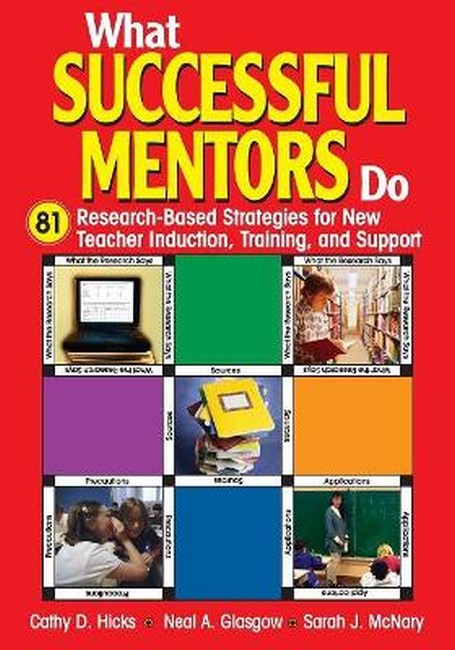Cathy D. Hicks most recently directed the Beginning Teacher Support and Assessment (BTSA) program for the San Dieguito Union High School District in Southern California. She oversaw an induction program supporting beginning teachers. She served for ten years on the executive board of the California Association of School Health Educators (CASHE) and has been an adjunct faculty member at California State University at San Marcos. She is co-author of five books: What Successful Teachers Do: 91 Research-Based Strategies for New and Veteran Teachers (2003); What Successful Mentors Do: 81 Research- Based Strategies for New Teacher Induction, Training, and Support (2005); What Successful Teachers Do in Inclusive Classrooms: 60 Research-Based Strategies That help Special Learns (2005); and What Successful Teachers Do in Diverse Classrooms: 71 Research-Based Strategies for New and Veteran Teachers (2006); What Successful Teachers Do: 101 Research-Based Strategies for new and Veteran Teachers (2009).She is a frequent presenter on educational topics both at the state and national level. She taught Physical Education and Health at both the middle and high school level for more than 25 years. During that time, she was involved in the California State Mentor Teacher Program and mentored new teachers in her district for more than 17 years. Her energy, enthusiasm, and passion for teaching and supporting new teachers reinforce the career path she chose in elementary school. She believes the most effective teachers are the ones who never settle for "good enough," but continue to grow, stretch, reflect, create, collaborate, and take risks throughout their teaching career. Neal A. Glasgow's experience includes serving as a secondary school science and art teacher both in California and New York, as a university biotechnology teaching laboratory director and laboratory technician, and as an educational consultant and frequent speaker on many educational topics. He is the author or coauthor of ten books on educational topics: What Successful Schools Do to Involve Families: Fifty Research-Based Strategies for Teachers and Administrators (2008), What Successful Literacy Teachers Do: 70 Research-Based Strategies for Teachers, Reading Coaches, and Instructional Planners (2007), What Successful Teachers Do in Diverse Classrooms: 71 Research-Based Strategies for New and Veteran Teachers (2006); What Successful Teachers Do in Inclusive Classrooms: 60 Research-Based Strategies That Help Special Learners (2005); What Successful Mentors Do: 81 Researched-Based Strategies for New Teacher Induction, Training, and Support (2004); What Successful Teachers Do: 91 Research-Based Strategies for New and Veteran Teachers (2003); Tips for Science Teachers: Research-Based Strategies to Help Students Learn (2001); New Curriculum for New Times: A Guide to Student-Centered, Problem-Based Learning (1997); Doing Science: Innovative Curriculum Beyond the Textbook for the Life Sciences (1997); and Taking the Classroom to the Community: A Guidebook (1996). Sarah J. McNary is currently teaching a credit recov-ery program for the San Dieguito Union High School District in Southern California, where she is also the district's consultant for special education working with the Beginning Teacher Support and Assessment (BTSA)/Induction program. She is a faculty member in the Masters of Education program for the University of Phoenix. Over the past 15 years she has taught SH, SDC, RSP, and general education classes at the ele-mentary, middle school, and high school levels. She is a frequent presenter on a variety of aspects of special education and student support. She is innately curious and is a firm believer in lifelong learning. When asked what she teaches, Sarah will answer, "Kids"; when asked what she teaches kids, she responds, "Life! I just use my curriculum to do it!" She and her husband split their time between Encinitas and their mountain home. She is also the mother of two teenagers.
Request Academic Copy
Please copy the ISBN for submitting review copy form
Description
Foreword - Don Rizzi Preface Acknowledgments Introduction: The Mentoring Process Is a Journey, Not a Destination 1. Choosing the Best Strategies for Supporting New Teachers 2. Supporting New Teachers as They Interact and Collaborate With Students 3. Supporting New Teachers as They Organize Classroom Management and Discipline Policies 4. Supporting New Teachers as They Develop Strategies for Managing Curriculum and Pedagogy 5. Supporting New Teachers as They Develop, Use, and Evaluate Student Assessment Instruments 6. Supporting New Teachers as They Develop Personal Teaching Styles and Time Management Strategies 7. Supporting New Teachers as They Develop a Variety of Strategies for Helping At-Risk and Special Needs Students Succeed 8. Supporting New Teachers as They Develop Strategies for Embracing and Celebrating Diversity 9. Supporting New Teachers As They Develop Strategies for Working With New Technologies 10. Supporting New Teachers as They Develop Positive Relationships With Parents and Community Index
"here is no 'one size fits all' professional development. Teaching is exciting and rewarding, but it is like pro football in that on any given day most anything may work, while on other days nothing seems to work. But you still need to keep on playing your best. Good mentors help keep good teachers playing at their very best. . . . As the authors so aptly suggest, good teaching is more a journey than a destination. This book will help both mentors and teachers to navigate this journey successfully." -- Stephen Sroka, Health Education Consultant "What a great book to provide for all veteran teachers so that when we are chatting in the lunchroom and a 'new' teacher shares a dilemma, anyone on staff can chime in with advice, backed by research and experience." -- Diane Mierzwik, Teacher and Mentor "Provides a wide range of practical suggestions for mentors that are based on current research and that can be 'harvested' whenever needed. The 'Precautions and Possible Pitfalls' sections serve as a welcome safety net, helping mentors to proactively examine and strategize solutions for anticipated challenges. The 'Sources' sections are particularly helpful in offering additional readings for those mentors who are interested in going deeper into a topic. What Successful Mentors Do is easy to use, linked to best practices, and is certain to be an invaluable resource for new and returning mentors." -- Theresa Ford, Developer/Consultant

